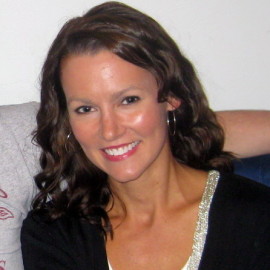How my story begins: I had some subtle changes with my body that I had brushed off as peri-menopause. My older sister started 'the change' at my age, so I thought I was, too. I would occasionally have spotting, sometimes a few days after my period ended, or after exercising. The most noticeable change was the increase in watery discharge. It wasn't bloody or foul-smelling, so I just rolled with it and bought lots of panty liners.
At my annual checkup, my doctor did a PAP and an HPV test. A few days later I got the call that I needed a colposcopy. The doctor was reassuring, saying that they do this all the time and it hardly ever comes back as cancerous. Three days later a nurse called and asked me to come in right away. I just knew it wasn't good. My doctor referred me to a gynecological oncologist, telling me that I would need, at the minimum, a radical hysterectomy.
Life before my diagnosis: I was a typical 'sandwich' mom. I cared for my two young sons as well as my elderly mother who has lymphoma and dementia. I put myself last on my to-do list. But I did make it to my annual checkup every year, and that is what helped uncover my cancer at a treatable stage.
How I felt after diagnosis: I used to tell my husband that I knew I would get cancer. My dad died of prostate cancer and my mom has terminal lymphoma. I just didn't think it would happen when I was 41! I was in shock. The words, "I have cancer" played over and over in my head. I was terrified to leave my sons without a mother. I didn't know the stage or if it had spread for almost two weeks after my initial diagnosis. The mind goes to some pretty dark places when there are unknowns.
Telling my family and friends: I hated telling people, but I had to. I needed help. I needed people on my side. I needed people to talk me off the ledge. It was hardest to tell my mom. The sounds of the sobs catching in her throat still haunt me.
We decided not to tell our boys until after we learned the pathology. I did not want them to deal with the unknowns. All they knew was that cancer = death. I was hoping that I could change that for them. We told them that my baby-growing parts weren't working right and since we were done having babies the doctors wanted to take them out. They seemed to be OK with that explanation.
My treatment: I had a laparoscopic radical hysterectomy. My ovaries were left in place as they looked healthy.
How I felt after treatment: I went home the day after surgery. Each day I felt a little better until one night I had horrible headaches and I could hear my blood rushing in my ears. But I was so weak and disoriented that I couldn't fully wake up to do anything about it. That next morning I felt awful and I had a huge bruise along my flank. My husband was worried because I was so pale. We called my surgeon who told us to go to the ER. They did a blood test there and my hemoglobin was 6. I was bleeding internally. I was given two units of blood and sent to get scanned to find the source of the bleed. The test showed no active bleeding, so whatever it was had stopped on its own. I remained hospitalized for the next week with fevers, rashes, and severe joint pain in my arms and hands that boggled the minds of my doctors. They eventually took me off of my IV antibiotics and everything resolved. I was never so happy to be going home!
What was most difficult for me: The second hospital stay was the hardest because I didn't plan for it. I had help lined up for my surgery, but not for the complications. My husband was trying to be a boss, a dad, a husband (I was two hours from home), all the while not knowing what was going on.
While in the hospital the second time, my surgeon shared my pathology with me. I would not require any further treatment. Finally some good news!
What I did to help myself: I allowed myself to rest. A lot. Even when there were tons of things I should have been doing. And I talked to other cancer fighters. The feeling of solidarity made me feel stronger. This can be a very lonely fight, but there are people out there who want to listen, want to help.
My life after cancer: I am still recovering. My body will never look quite the same and I'm OK with that. I feel like I see things differently. I have a new perspective on what matters most in my life. I can choose to let this make me better or bitter, and I choose 'better.' (that was from some quote I saw, but I can't remember who said it)
Where I am today: I'm focusing on being healthy - eating right, exercising, and laughing. A lot.
What I want other women to know: Screening is so important. It's not fun, I know. Mammos and Paps and colonoscopies are unpleasant. I am guilty of canceling my appointments in the past for various not-so-legitimate reasons. But if I had cancelled my cervical cancer screening this year (as I almost did because I was on the last day of my period) who knows what would've happened. So I will tell any woman who will listen (or man for that matter) how important regular screening really is.
